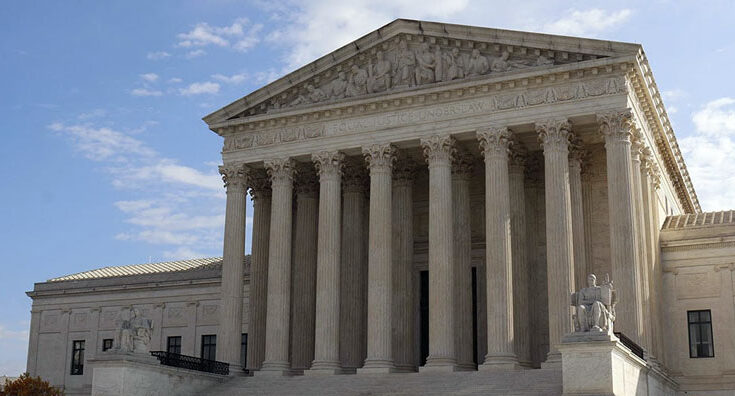File photo by Haley Smilow/Cronkite News: The U.S. Supreme Court unanimously upheld access to a widely used abortion drug, tossing out a challenge to the way FDA approved mifepristone.
By Morgan Kubasko/Cronkite News
WASHINGTON – A unanimous U.S. Supreme Court upheld access to a widely used abortion drug Thursday, tossing out an effort to take mifepristone off the market on grounds that the anti-abortion doctors who brought the case lacked legal standing to sue.
The drug is used in nearly two-thirds of U.S. abortions available.
The justices – splintered ideologically in other abortion cases – all agreed that the doctors who brought this suit couldn’t show they’d suffered any personal harm from keeping mifepristone on the market.
“A plaintiff’s desire to make a drug less available for others does not establish standing to sue,” Justice Brett Kavanaugh wrote in the ruling. “The plaintiff doctors and medical associations do not prescribe or use mifepristone. And FDA has not required the plaintiffs to do anything or to refrain from doing anything.”
“Because the plaintiffs do not use mifepristone, they obviously can suffer no physical injuries from FDA’s actions relaxing regulation of mifepristone,” the ruling said.
But the ruling left open the possibility of challenges to mifepristone from other potential plaintiffs, including states.
Arizona Attorney General Kris Mayes lauded the high court for overturning a “disastrous” effort by a lower court to ban mifepristone. The “decision will save lives and avoid widespread confusion among providers, distributors, pharmacies, and patients,” she said in a written statement.
President Joe Biden, attending a summit in Italy, said that while the ruling represented a win for reproductive rights, “it does not change the fact that the Supreme Court overturned Roe v. Wade two years ago.”
“It does not change the fact that the right for a woman to get the treatment she needs is imperiled if not impossible in many states,” Biden said in a statement issued by the White House.
Anti-abortion groups said they were disappointed at the ruling.
Erin Hawley, senior counsel at Alliance Defending Freedom, said the group will continue to seek ways to take the drug off the market.
“While we’re disappointed with the court’s decision, we will continue to advocate for women and work to restore commonsense safeguards for abortion drugs—like an initial office visit to screen for ectopic pregnancies,” she said in a written statement.
The high court ended nearly a half-century of constitutional protection for abortion rights in June 2022, in Dobbs v. Jackson Women’s Health. The ruling, which overturned Roe v. Wade, put regulation of abortion back to state control for the first time since 1973.
Roe halted enforcement of state abortion bans that were in effect at the time, including a near-total Arizona ban enacted in 1864.
Ahead of the widely anticipated end to Roe, Arizona’s governor at the time, Republican Doug Ducey, signed a law banning abortions after 15 weeks of pregnancy. That ban remains in effect.
Earlier this year, the Legislature repealed a near-total ban enacted in 1864, before statehood. The current governor, Democrat Katie Hobbs, signed the repeal on May 2.
A report last month from the Society of Family Planning, which tracks abortions nationwide, shows there were 1,470 abortions in Arizona in the month before the Dobbs ruling, and 1,020 last December, the latest month for which it has data.
Much of the fight since Dobbs has taken place in state legislatures. All but nine states have some restrictions, including 14 states with bans that start at conception. Arizona bans abortion after 15 weeks of pregnancy.
Anti-abortion groups have looked for new ways to restrict access, including the case decided Thursday.
A group of anti-abortion doctors called Alliance for Hippocratic Medicine went to federal court to challenge the way the Food and Drug Administration approved mifepristone in 2000.
Scottsdale-based advocacy law firm Alliance Defending Freedom represented the group. In court, they asserted the FDA failed to thoroughly examine evidence regarding the drug’s safety, and exceeded its authority by later expanding access. Defenders of the drug point to a 2007 law that effectively ratified the FDA’s process.
In 2016 the FDA extended the use of mifepristone from seven to 10 weeks into a pregnancy and scaled back requirements for in-person doctor visits for a woman seeking a drug-induced abortion.
In 2021, during the COVID-19 pandemic, the FDA allowed delivery by mail, lifting a requirement for in-person distribution by a prescriber.
Since Dobbs, seven states — California, Colorado, Maine, Massachusetts, New York, Vermont, and Washington — adopted “shield laws” that protect telehealth providers who prescribe and ship abortion pills to women in states with bans.
The challenge tossed out Thursday was filed five months after the Dobbs ruling.
The Alliance for Hippocratic Medicine filed the lawsuit in Amarillo, Texas, where it was assigned to the only judge in that federal courthouse: Trump-appointee Matthew J. Kacsmaryk, whose anti-abortion views were well-known.
The judge issued a ruling in April 2023 to suspend the FDA’s initial approval of mifepristone and its actions in 2016 and 2021, which he called “arbitrary” and unsupported by clinical data.
The Department of Justice appealed. The U.S. Court of Appeals for the Fifth Circuit, a conservative court that handles cases from Texas, partially overturned the lower court. While the initial drug approval would stand, so would most of the lower court’s rollback of FDA changes from 2016 and 2021.
The Supreme Court heard arguments on March 26 that focused heavily on the plaintiffs’ standing under Article III of the Constitution.
Justices from both the conservative and liberal wings of the court were openly skeptical of claims that anti-abortion doctors suffer harm from the availability of mifepristone. By law, none could be compelled to prescribe it or to otherwise participate in an abortion, justices pointed out.
That skepticism telegraphed by the court in oral arguments carried over into the ruling.
The ruling stated that the purpose of standing is to ensure that only affected parties can press complaints to the government. The court found that the Alliance for Hippocratic Medicine was challenging the FDA’s regulations of others, as they do not prescribe or use mifepristone.
The court stated that the group’s pro-life beliefs were not sufficient to grant them standing.
“This ruling rightfully rejects extremist’s efforts to restrict Americans’ access to abortion medication,” Rep. Raul Grijalva, D-Tucson, posted on X.










